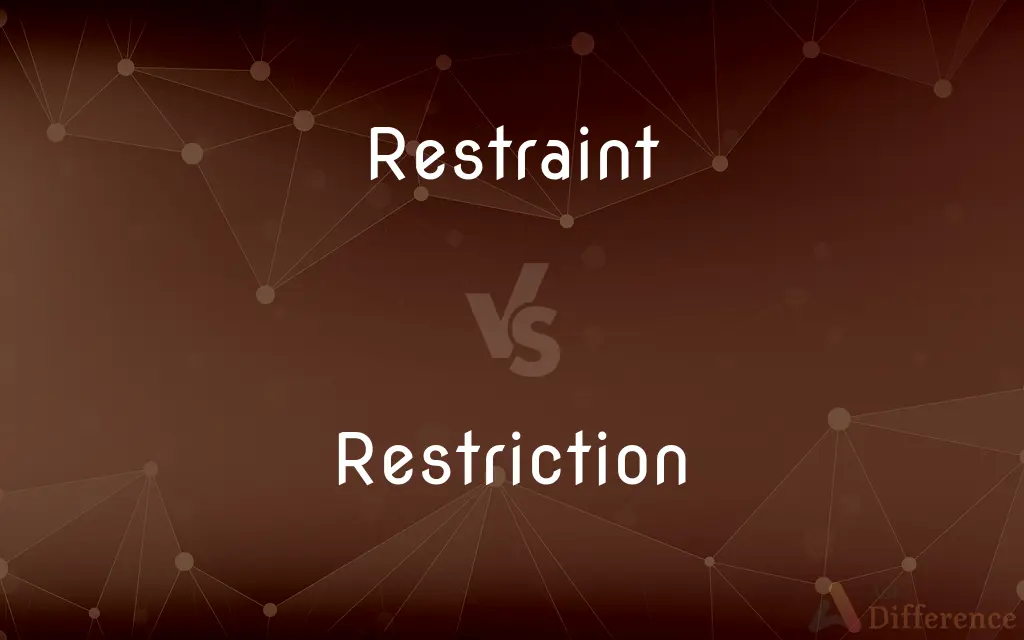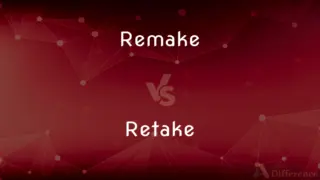Restraint vs. Restriction — What's the Difference?
By Tayyaba Rehman & Urooj Arif — Updated on March 21, 2024
Restraint involves self-control or external control to limit actions or behavior, while restriction refers to specific rules or limitations imposed on something or someone.

Difference Between Restraint and Restriction
Table of Contents
ADVERTISEMENT
Key Differences
Restraint is often about controlling one's own impulses, emotions, or actions to prevent excessive or undesirable outcomes. It can come from within an individual or be applied by external forces in situations requiring moderation. On the other hand, restriction is explicitly about setting boundaries or limits, usually defined by rules or laws, to regulate behavior or activities.
Restraint emphasizes moderation and the prevention of excess, suggesting a broader application in both personal and external contexts. It can be applied to emotional responses, physical actions, or even creativity. Whereas restriction focuses on the imposition of clear, often quantifiable limits that are designed to constrain certain behaviors or activities within predefined parameters.
In the context of law and governance, restraint is used to describe measures or practices designed to keep actions within legal or ethical boundaries without direct interference. This concept relies on the principle of minimal necessary force or influence. Restriction, however, refers to specific legal or regulatory measures that directly limit what individuals or organizations can do, often detailed in legislation or policies.
When discussing psychological or emotional health, restraint refers to the ability or practice of managing one’s impulses, emotions, or desires effectively. This self-regulation is crucial for personal development and social interactions. Restriction, in contrast, might refer to external limitations imposed on individuals, which can affect their mental health or behavior, depending on the context and nature of the restrictions.
In innovation and creativity, restraint can be seen as a guideline or principle that encourages focus and clarity, preventing overcomplication. It's about finding balance and effectiveness within boundaries. Restriction, conversely, is often viewed as an obstacle that limits creative freedom and the exploration of new ideas, potentially stifling innovation.
ADVERTISEMENT
Comparison Chart
Nature
Self-control or external control to limit actions or behavior.
Specific rules or limitations imposed externally.
Application
Broad, can be emotional, physical, or creative.
Specific, often related to behavior or activities.
Origin
Can be internal (self-imposed) or external.
Externally imposed by others, laws, or regulations.
Purpose
To prevent excess and encourage moderation.
To regulate or limit behavior within predefined parameters.
Psychological Impact
Encourages self-regulation and moderation.
Can be perceived as limiting or restricting freedom.
Compare with Definitions
Restraint
A measure or condition that keeps someone or something under control.
The artist used restraint to keep her work minimalistic.
Restriction
Limitations on the use or access to resources.
Water usage restrictions were enacted during the drought.
Restraint
Legal or regulatory measures to limit certain actions.
The court imposed a restraint against the company's operations.
Restriction
Conditions that confine someone's activities or freedoms.
Health restrictions prevented him from participating in the sport.
Restraint
Emotional or mental discipline.
She practiced emotional restraint to maintain her composure.
Restriction
Specific boundaries set on behavior or actions.
The contract includes restrictions on sharing confidential information.
Restraint
Equipment or devices designed to restrict movement.
Safety restraints were checked before the ride started.
Restriction
A rule or law that limits what people can do.
The city imposed parking restrictions downtown.
Restraint
Self-control to avoid excessive behavior.
He showed remarkable restraint in not responding to the provocation.
Restriction
Constraints applied to capabilities or functionalities.
The software has restrictions in the free version.
Restraint
The act of restraining
Police restraint of the suspect.
Restriction
The action of restricting or the state of being restricted
The country's restriction of immigration.
Restraint
The condition of being restrained, especially the condition of losing one's freedom
A suspect held in restraint.
Restriction
Something that restricts; a regulation or limitation
A restriction banning dogs from the beach.
Restraint
An influence that inhibits or restrains
"If the enemy could be defined as radically evil, then the restraints of morality did not apply" (James Carroll).
Restriction
The act of restricting, or the state of being restricted.
Restraint
A device or other means of restraining movement
A child restraint in a car.
Restriction
A regulation or limitation that restricts.
Restraint
Control of the expression of one's feelings; constraint
Cursed without restraint.
Restriction
(biology) The mechanism by which a cell degrades foreign DNA material.
Restraint
(countable) something that restrains, ties, fastens or secures
Make sure all the restraints are tight.
Restriction
The act of restricting, or state of being restricted; confinement within limits or bounds.
This is to have the same restriction with all other recreations,that it be made a divertisement.
Restraint
(uncountable) control or caution; reserve
Try to exercise restraint when talking to your boss.
Restriction
That which restricts; limitation; restraint; as, restrictions on trade.
Restraint
The act or process of restraining, or of holding back or hindering from motion or action, in any manner; hindrance of the will, or of any action, physical or mental.
No man was altogether above the restrains of law, and no man altogether below its protection.
Restriction
A principle that limits the extent of something;
I am willing to accept certain restrictions on my movements
Restraint
The state of being restrained.
Restriction
An act of limiting or restricting (as by regulation)
Restraint
That which restrains, as a law, a prohibition, or the like; limitation; restriction.
For one restraint, lords of the world besides.
Restriction
The act of keeping something within specified bounds (by force if necessary)
Restraint
The of act controlling by restraining someone or something;
The unlawful restraint of trade
Restraint
Discipline in personal and social activities;
He was a model of polite restraint
She never lost control of herself
Restraint
The state of being physically constrained;
Dogs should be kept under restraint
Restraint
A rule or condition that limits freedom;
Legal restraints
Restraints imposed on imports
Restraint
Lack of ornamentation;
The room was simply decorated with great restraint
Restraint
A device that retards something's motion;
The car did not have proper restraints fitted
Common Curiosities
How does restraint contribute to personal development?
Restraint helps in developing self-discipline, emotional intelligence, and the ability to manage impulses, which are crucial for personal growth.
What is the primary difference between restraint and restriction?
Restraint refers to self-control or external control to limit actions, whereas restriction is about specific rules or limits imposed on something or someone.
Are restrictions always external?
Restrictions are typically imposed by external factors, such as laws, rules, or other people.
Can restrictions be beneficial?
Yes, restrictions can be beneficial in regulating behavior, maintaining order, and protecting resources or safety.
How do legal restraints differ from legal restrictions?
Legal restraints are measures to keep actions within legal bounds, often through minimal interference, whereas legal restrictions are specific limitations set by law.
Can restraint improve relationships?
Yes, practicing restraint, especially in emotional expression and responses, can improve communication and understanding in relationships.
What role does restraint play in conflict resolution?
Restraint can play a significant role in conflict resolution by preventing escalation and facilitating calm, rational dialogue.
Are there situations where restrictions are lifted?
Restrictions may be lifted when conditions improve or goals have been met, such as lifting water usage restrictions after a drought ends.
Can restraint be voluntary?
Yes, restraint can be a voluntary act of self-control or moderation.
Is emotional restraint important in professional settings?
Emotional restraint is crucial in professional settings as it helps maintain professionalism and effective communication.
Do restrictions limit creativity?
While restrictions can pose challenges, they often encourage creative problem-solving within set boundaries.
How does self-restraint affect mental health?
Self-restraint, when balanced, positively affects mental health by reducing impulsivity and promoting emotional stability.
Why are restrictions placed on the use of public resources?
Restrictions on public resources are often placed to ensure fair usage, conserve resources, and protect public health and safety.
How do companies enforce restrictions?
Companies enforce restrictions through policies, agreements, and monitoring, ensuring compliance with legal and company standards.
Can too much restraint be harmful?
Excessive restraint can lead to stress and hinder spontaneous expression or creativity, highlighting the need for balance.
Share Your Discovery

Previous Comparison
Remake vs. Retake
Next Comparison
Caliphate vs. EmirateAuthor Spotlight
Written by
Tayyaba RehmanTayyaba Rehman is a distinguished writer, currently serving as a primary contributor to askdifference.com. As a researcher in semantics and etymology, Tayyaba's passion for the complexity of languages and their distinctions has found a perfect home on the platform. Tayyaba delves into the intricacies of language, distinguishing between commonly confused words and phrases, thereby providing clarity for readers worldwide.
Co-written by
Urooj ArifUrooj is a skilled content writer at Ask Difference, known for her exceptional ability to simplify complex topics into engaging and informative content. With a passion for research and a flair for clear, concise writing, she consistently delivers articles that resonate with our diverse audience.














































